Mental-Health Nursing, Case Study of Lisa
VerifiedAdded on 2023/01/18
|10
|2981
|56
AI Summary
When dealing with victims of drug abuse, being in a position to understand the root cause of their habits is very important. It is the foundation when determining the best approach to help them out of the condition. This is in consideration to the fact that drug addicts find themselves in the habit because of different reasons. The reasons behind drug abuse are called risk factors.
Contribute Materials
Your contribution can guide someone’s learning journey. Share your
documents today.
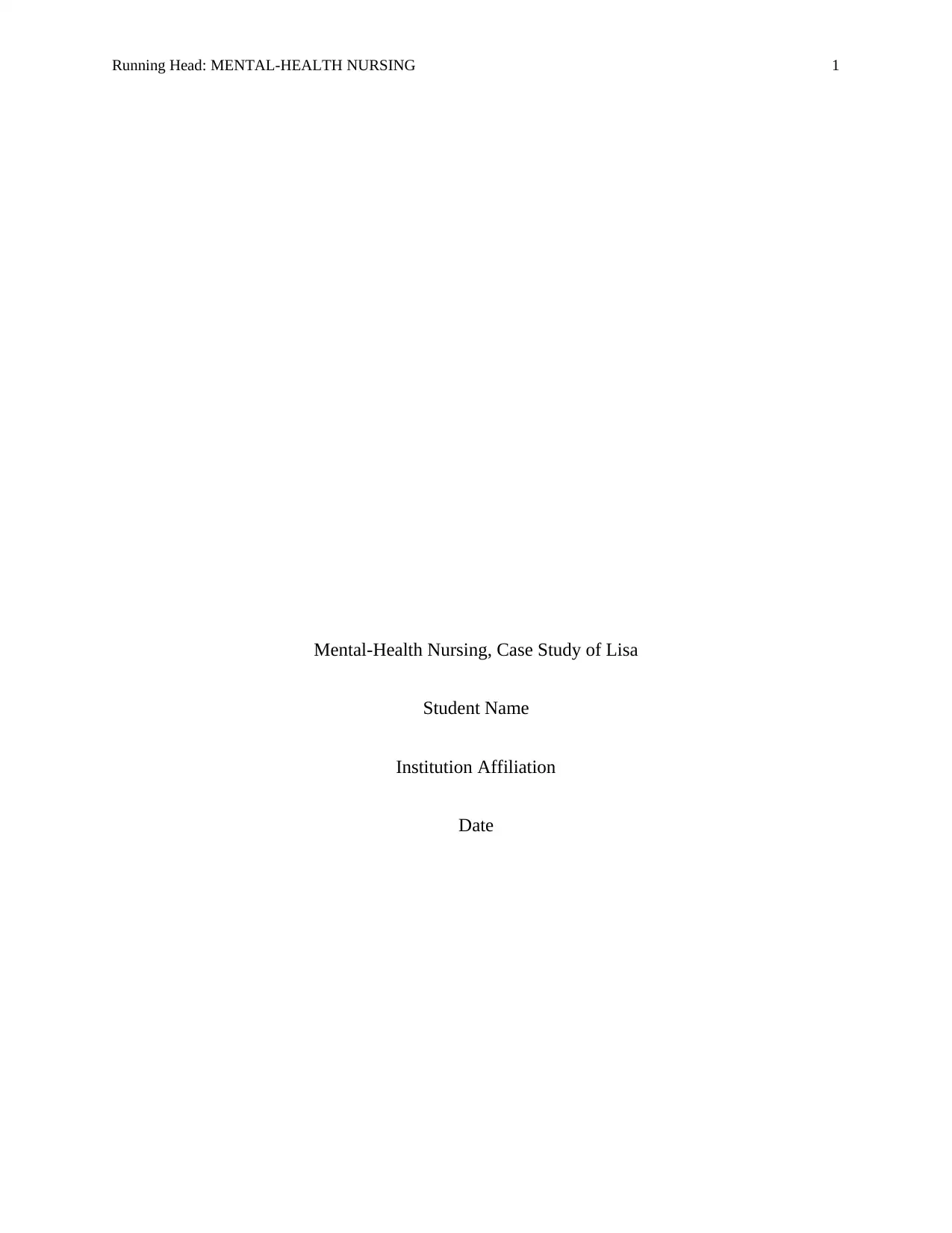
Running Head: MENTAL-HEALTH NURSING 1
Mental-Health Nursing, Case Study of Lisa
Student Name
Institution Affiliation
Date
Mental-Health Nursing, Case Study of Lisa
Student Name
Institution Affiliation
Date
Secure Best Marks with AI Grader
Need help grading? Try our AI Grader for instant feedback on your assignments.
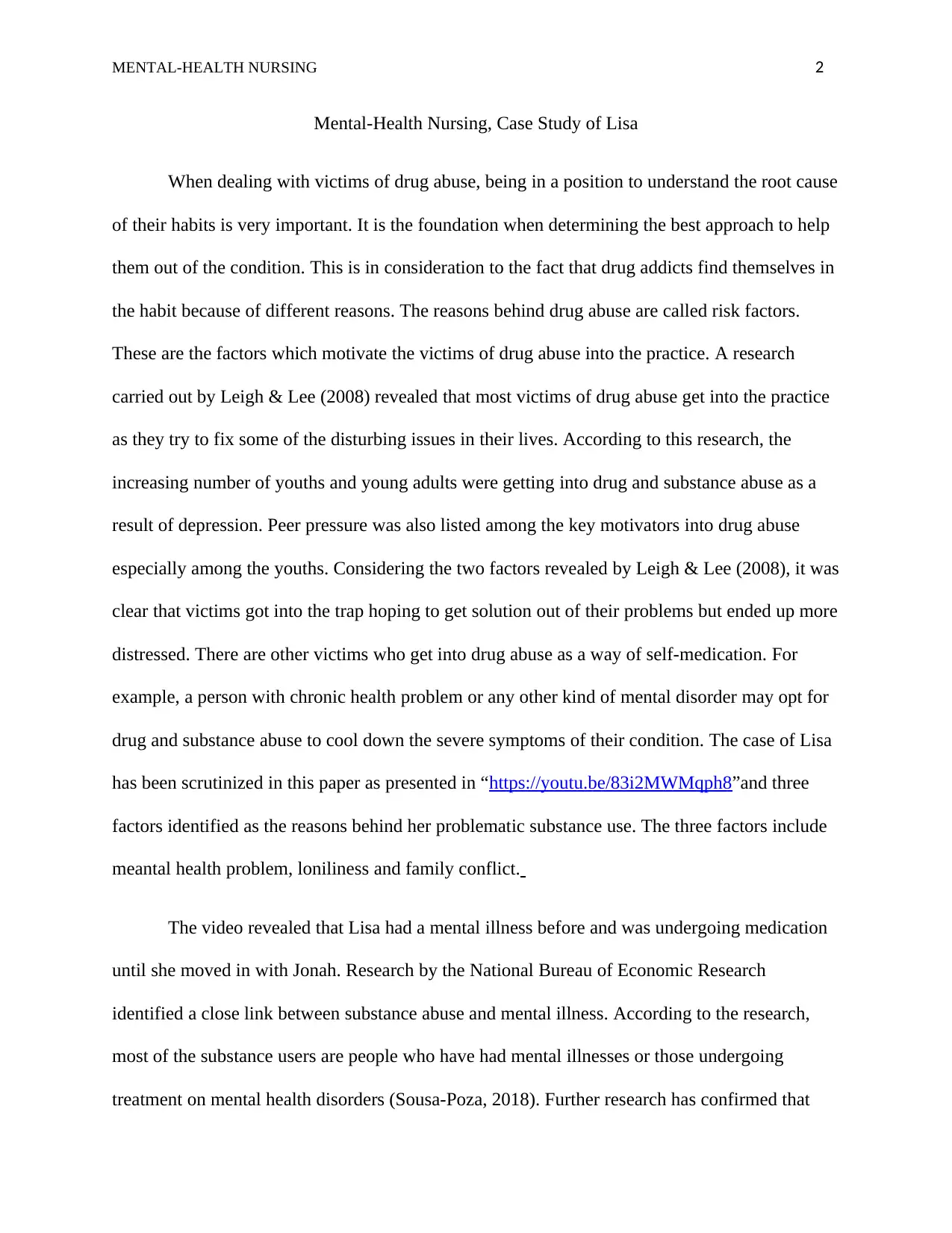
MENTAL-HEALTH NURSING 2
Mental-Health Nursing, Case Study of Lisa
When dealing with victims of drug abuse, being in a position to understand the root cause
of their habits is very important. It is the foundation when determining the best approach to help
them out of the condition. This is in consideration to the fact that drug addicts find themselves in
the habit because of different reasons. The reasons behind drug abuse are called risk factors.
These are the factors which motivate the victims of drug abuse into the practice. A research
carried out by Leigh & Lee (2008) revealed that most victims of drug abuse get into the practice
as they try to fix some of the disturbing issues in their lives. According to this research, the
increasing number of youths and young adults were getting into drug and substance abuse as a
result of depression. Peer pressure was also listed among the key motivators into drug abuse
especially among the youths. Considering the two factors revealed by Leigh & Lee (2008), it was
clear that victims got into the trap hoping to get solution out of their problems but ended up more
distressed. There are other victims who get into drug abuse as a way of self-medication. For
example, a person with chronic health problem or any other kind of mental disorder may opt for
drug and substance abuse to cool down the severe symptoms of their condition. The case of Lisa
has been scrutinized in this paper as presented in “https://youtu.be/83i2MWMqph8”and three
factors identified as the reasons behind her problematic substance use. The three factors include
meantal health problem, loniliness and family conflict.
The video revealed that Lisa had a mental illness before and was undergoing medication
until she moved in with Jonah. Research by the National Bureau of Economic Research
identified a close link between substance abuse and mental illness. According to the research,
most of the substance users are people who have had mental illnesses or those undergoing
treatment on mental health disorders (Sousa-Poza, 2018). Further research has confirmed that
Mental-Health Nursing, Case Study of Lisa
When dealing with victims of drug abuse, being in a position to understand the root cause
of their habits is very important. It is the foundation when determining the best approach to help
them out of the condition. This is in consideration to the fact that drug addicts find themselves in
the habit because of different reasons. The reasons behind drug abuse are called risk factors.
These are the factors which motivate the victims of drug abuse into the practice. A research
carried out by Leigh & Lee (2008) revealed that most victims of drug abuse get into the practice
as they try to fix some of the disturbing issues in their lives. According to this research, the
increasing number of youths and young adults were getting into drug and substance abuse as a
result of depression. Peer pressure was also listed among the key motivators into drug abuse
especially among the youths. Considering the two factors revealed by Leigh & Lee (2008), it was
clear that victims got into the trap hoping to get solution out of their problems but ended up more
distressed. There are other victims who get into drug abuse as a way of self-medication. For
example, a person with chronic health problem or any other kind of mental disorder may opt for
drug and substance abuse to cool down the severe symptoms of their condition. The case of Lisa
has been scrutinized in this paper as presented in “https://youtu.be/83i2MWMqph8”and three
factors identified as the reasons behind her problematic substance use. The three factors include
meantal health problem, loniliness and family conflict.
The video revealed that Lisa had a mental illness before and was undergoing medication
until she moved in with Jonah. Research by the National Bureau of Economic Research
identified a close link between substance abuse and mental illness. According to the research,
most of the substance users are people who have had mental illnesses or those undergoing
treatment on mental health disorders (Sousa-Poza, 2018). Further research has confirmed that
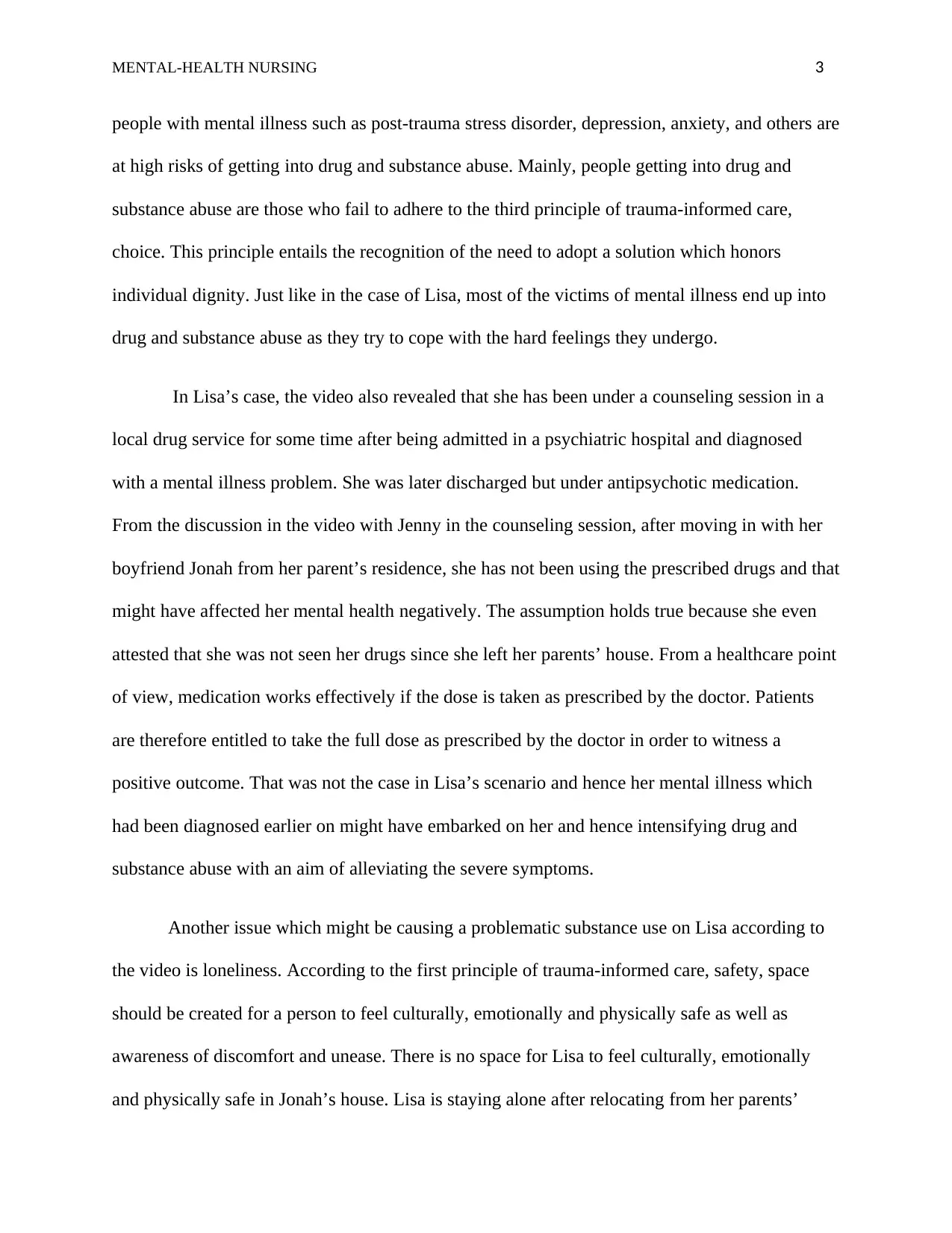
MENTAL-HEALTH NURSING 3
people with mental illness such as post-trauma stress disorder, depression, anxiety, and others are
at high risks of getting into drug and substance abuse. Mainly, people getting into drug and
substance abuse are those who fail to adhere to the third principle of trauma-informed care,
choice. This principle entails the recognition of the need to adopt a solution which honors
individual dignity. Just like in the case of Lisa, most of the victims of mental illness end up into
drug and substance abuse as they try to cope with the hard feelings they undergo.
In Lisa’s case, the video also revealed that she has been under a counseling session in a
local drug service for some time after being admitted in a psychiatric hospital and diagnosed
with a mental illness problem. She was later discharged but under antipsychotic medication.
From the discussion in the video with Jenny in the counseling session, after moving in with her
boyfriend Jonah from her parent’s residence, she has not been using the prescribed drugs and that
might have affected her mental health negatively. The assumption holds true because she even
attested that she was not seen her drugs since she left her parents’ house. From a healthcare point
of view, medication works effectively if the dose is taken as prescribed by the doctor. Patients
are therefore entitled to take the full dose as prescribed by the doctor in order to witness a
positive outcome. That was not the case in Lisa’s scenario and hence her mental illness which
had been diagnosed earlier on might have embarked on her and hence intensifying drug and
substance abuse with an aim of alleviating the severe symptoms.
Another issue which might be causing a problematic substance use on Lisa according to
the video is loneliness. According to the first principle of trauma-informed care, safety, space
should be created for a person to feel culturally, emotionally and physically safe as well as
awareness of discomfort and unease. There is no space for Lisa to feel culturally, emotionally
and physically safe in Jonah’s house. Lisa is staying alone after relocating from her parents’
people with mental illness such as post-trauma stress disorder, depression, anxiety, and others are
at high risks of getting into drug and substance abuse. Mainly, people getting into drug and
substance abuse are those who fail to adhere to the third principle of trauma-informed care,
choice. This principle entails the recognition of the need to adopt a solution which honors
individual dignity. Just like in the case of Lisa, most of the victims of mental illness end up into
drug and substance abuse as they try to cope with the hard feelings they undergo.
In Lisa’s case, the video also revealed that she has been under a counseling session in a
local drug service for some time after being admitted in a psychiatric hospital and diagnosed
with a mental illness problem. She was later discharged but under antipsychotic medication.
From the discussion in the video with Jenny in the counseling session, after moving in with her
boyfriend Jonah from her parent’s residence, she has not been using the prescribed drugs and that
might have affected her mental health negatively. The assumption holds true because she even
attested that she was not seen her drugs since she left her parents’ house. From a healthcare point
of view, medication works effectively if the dose is taken as prescribed by the doctor. Patients
are therefore entitled to take the full dose as prescribed by the doctor in order to witness a
positive outcome. That was not the case in Lisa’s scenario and hence her mental illness which
had been diagnosed earlier on might have embarked on her and hence intensifying drug and
substance abuse with an aim of alleviating the severe symptoms.
Another issue which might be causing a problematic substance use on Lisa according to
the video is loneliness. According to the first principle of trauma-informed care, safety, space
should be created for a person to feel culturally, emotionally and physically safe as well as
awareness of discomfort and unease. There is no space for Lisa to feel culturally, emotionally
and physically safe in Jonah’s house. Lisa is staying alone after relocating from her parents’
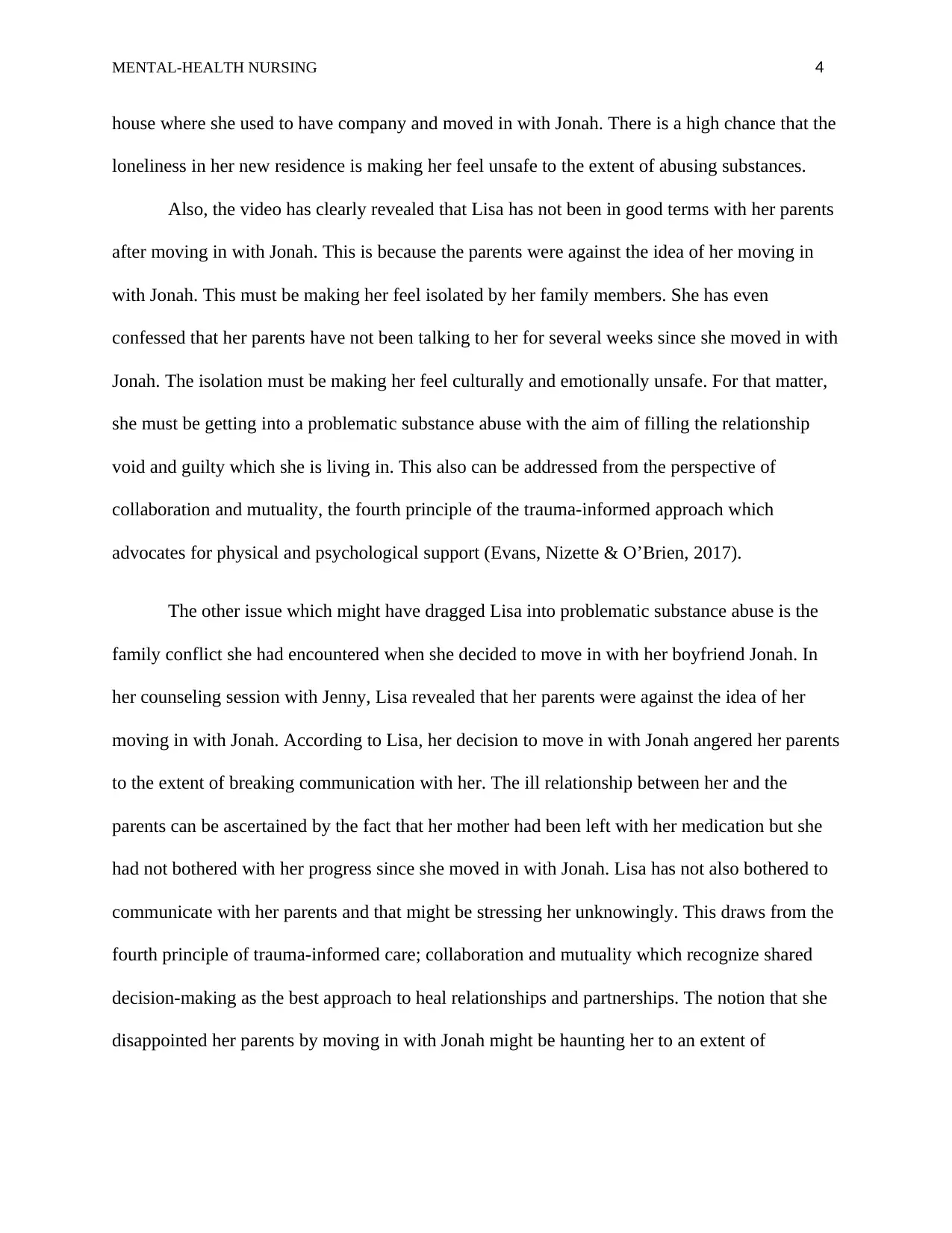
MENTAL-HEALTH NURSING 4
house where she used to have company and moved in with Jonah. There is a high chance that the
loneliness in her new residence is making her feel unsafe to the extent of abusing substances.
Also, the video has clearly revealed that Lisa has not been in good terms with her parents
after moving in with Jonah. This is because the parents were against the idea of her moving in
with Jonah. This must be making her feel isolated by her family members. She has even
confessed that her parents have not been talking to her for several weeks since she moved in with
Jonah. The isolation must be making her feel culturally and emotionally unsafe. For that matter,
she must be getting into a problematic substance abuse with the aim of filling the relationship
void and guilty which she is living in. This also can be addressed from the perspective of
collaboration and mutuality, the fourth principle of the trauma-informed approach which
advocates for physical and psychological support (Evans, Nizette & O’Brien, 2017).
The other issue which might have dragged Lisa into problematic substance abuse is the
family conflict she had encountered when she decided to move in with her boyfriend Jonah. In
her counseling session with Jenny, Lisa revealed that her parents were against the idea of her
moving in with Jonah. According to Lisa, her decision to move in with Jonah angered her parents
to the extent of breaking communication with her. The ill relationship between her and the
parents can be ascertained by the fact that her mother had been left with her medication but she
had not bothered with her progress since she moved in with Jonah. Lisa has not also bothered to
communicate with her parents and that might be stressing her unknowingly. This draws from the
fourth principle of trauma-informed care; collaboration and mutuality which recognize shared
decision-making as the best approach to heal relationships and partnerships. The notion that she
disappointed her parents by moving in with Jonah might be haunting her to an extent of
house where she used to have company and moved in with Jonah. There is a high chance that the
loneliness in her new residence is making her feel unsafe to the extent of abusing substances.
Also, the video has clearly revealed that Lisa has not been in good terms with her parents
after moving in with Jonah. This is because the parents were against the idea of her moving in
with Jonah. This must be making her feel isolated by her family members. She has even
confessed that her parents have not been talking to her for several weeks since she moved in with
Jonah. The isolation must be making her feel culturally and emotionally unsafe. For that matter,
she must be getting into a problematic substance abuse with the aim of filling the relationship
void and guilty which she is living in. This also can be addressed from the perspective of
collaboration and mutuality, the fourth principle of the trauma-informed approach which
advocates for physical and psychological support (Evans, Nizette & O’Brien, 2017).
The other issue which might have dragged Lisa into problematic substance abuse is the
family conflict she had encountered when she decided to move in with her boyfriend Jonah. In
her counseling session with Jenny, Lisa revealed that her parents were against the idea of her
moving in with Jonah. According to Lisa, her decision to move in with Jonah angered her parents
to the extent of breaking communication with her. The ill relationship between her and the
parents can be ascertained by the fact that her mother had been left with her medication but she
had not bothered with her progress since she moved in with Jonah. Lisa has not also bothered to
communicate with her parents and that might be stressing her unknowingly. This draws from the
fourth principle of trauma-informed care; collaboration and mutuality which recognize shared
decision-making as the best approach to heal relationships and partnerships. The notion that she
disappointed her parents by moving in with Jonah might be haunting her to an extent of
Secure Best Marks with AI Grader
Need help grading? Try our AI Grader for instant feedback on your assignments.
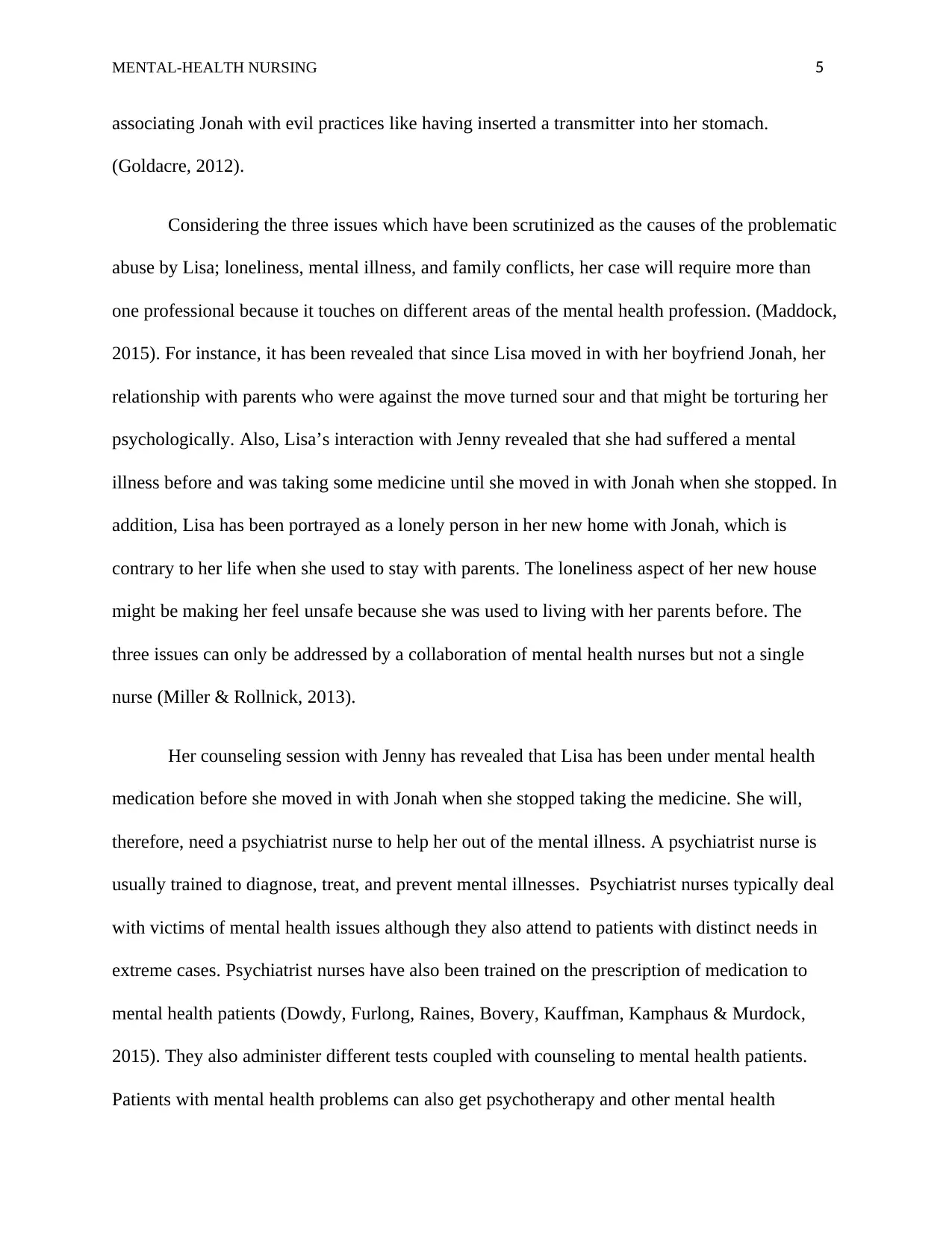
MENTAL-HEALTH NURSING 5
associating Jonah with evil practices like having inserted a transmitter into her stomach.
(Goldacre, 2012).
Considering the three issues which have been scrutinized as the causes of the problematic
abuse by Lisa; loneliness, mental illness, and family conflicts, her case will require more than
one professional because it touches on different areas of the mental health profession. (Maddock,
2015). For instance, it has been revealed that since Lisa moved in with her boyfriend Jonah, her
relationship with parents who were against the move turned sour and that might be torturing her
psychologically. Also, Lisa’s interaction with Jenny revealed that she had suffered a mental
illness before and was taking some medicine until she moved in with Jonah when she stopped. In
addition, Lisa has been portrayed as a lonely person in her new home with Jonah, which is
contrary to her life when she used to stay with parents. The loneliness aspect of her new house
might be making her feel unsafe because she was used to living with her parents before. The
three issues can only be addressed by a collaboration of mental health nurses but not a single
nurse (Miller & Rollnick, 2013).
Her counseling session with Jenny has revealed that Lisa has been under mental health
medication before she moved in with Jonah when she stopped taking the medicine. She will,
therefore, need a psychiatrist nurse to help her out of the mental illness. A psychiatrist nurse is
usually trained to diagnose, treat, and prevent mental illnesses. Psychiatrist nurses typically deal
with victims of mental health issues although they also attend to patients with distinct needs in
extreme cases. Psychiatrist nurses have also been trained on the prescription of medication to
mental health patients (Dowdy, Furlong, Raines, Bovery, Kauffman, Kamphaus & Murdock,
2015). They also administer different tests coupled with counseling to mental health patients.
Patients with mental health problems can also get psychotherapy and other mental health
associating Jonah with evil practices like having inserted a transmitter into her stomach.
(Goldacre, 2012).
Considering the three issues which have been scrutinized as the causes of the problematic
abuse by Lisa; loneliness, mental illness, and family conflicts, her case will require more than
one professional because it touches on different areas of the mental health profession. (Maddock,
2015). For instance, it has been revealed that since Lisa moved in with her boyfriend Jonah, her
relationship with parents who were against the move turned sour and that might be torturing her
psychologically. Also, Lisa’s interaction with Jenny revealed that she had suffered a mental
illness before and was taking some medicine until she moved in with Jonah when she stopped. In
addition, Lisa has been portrayed as a lonely person in her new home with Jonah, which is
contrary to her life when she used to stay with parents. The loneliness aspect of her new house
might be making her feel unsafe because she was used to living with her parents before. The
three issues can only be addressed by a collaboration of mental health nurses but not a single
nurse (Miller & Rollnick, 2013).
Her counseling session with Jenny has revealed that Lisa has been under mental health
medication before she moved in with Jonah when she stopped taking the medicine. She will,
therefore, need a psychiatrist nurse to help her out of the mental illness. A psychiatrist nurse is
usually trained to diagnose, treat, and prevent mental illnesses. Psychiatrist nurses typically deal
with victims of mental health issues although they also attend to patients with distinct needs in
extreme cases. Psychiatrist nurses have also been trained on the prescription of medication to
mental health patients (Dowdy, Furlong, Raines, Bovery, Kauffman, Kamphaus & Murdock,
2015). They also administer different tests coupled with counseling to mental health patients.
Patients with mental health problems can also get psychotherapy and other mental health
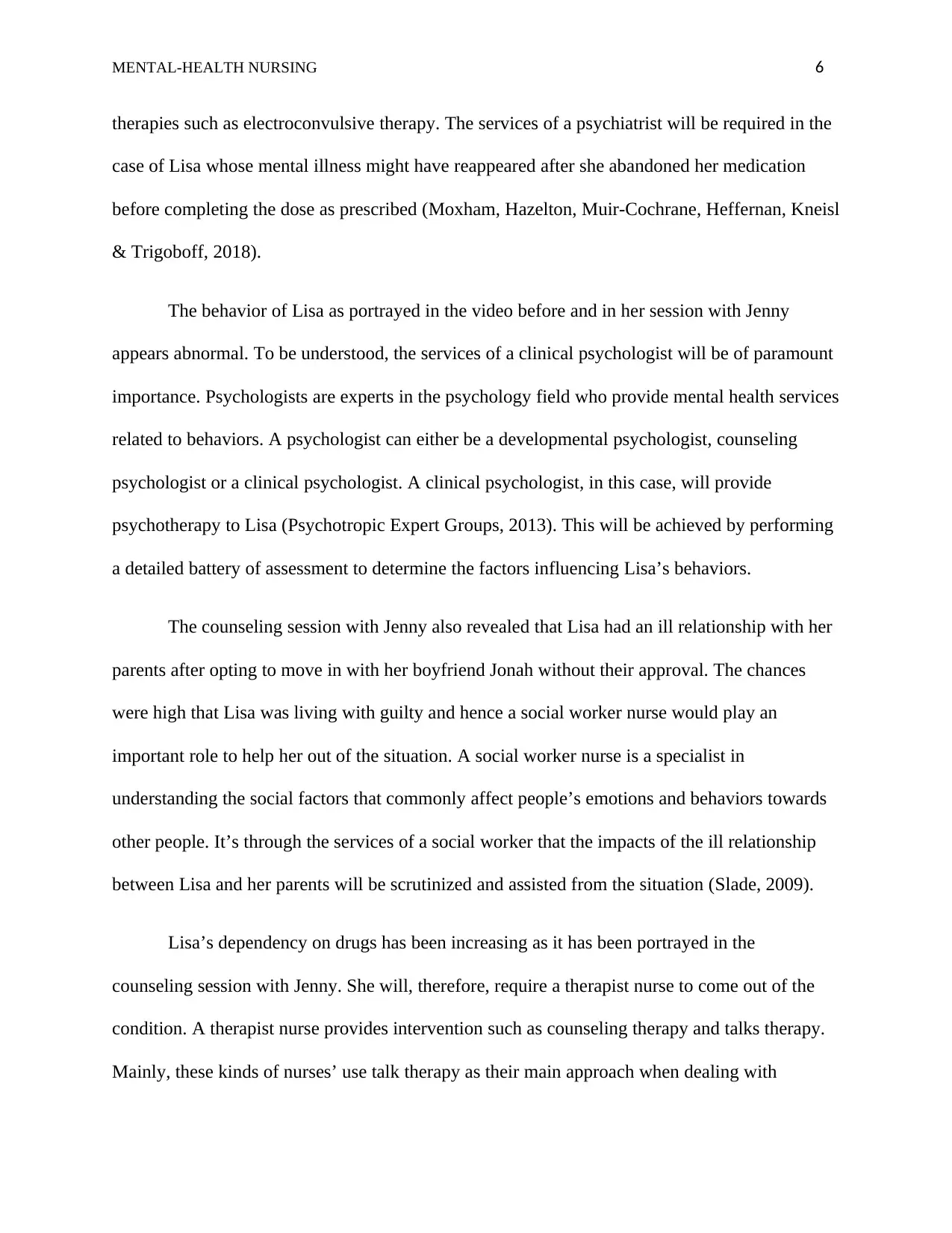
MENTAL-HEALTH NURSING 6
therapies such as electroconvulsive therapy. The services of a psychiatrist will be required in the
case of Lisa whose mental illness might have reappeared after she abandoned her medication
before completing the dose as prescribed (Moxham, Hazelton, Muir-Cochrane, Heffernan, Kneisl
& Trigoboff, 2018).
The behavior of Lisa as portrayed in the video before and in her session with Jenny
appears abnormal. To be understood, the services of a clinical psychologist will be of paramount
importance. Psychologists are experts in the psychology field who provide mental health services
related to behaviors. A psychologist can either be a developmental psychologist, counseling
psychologist or a clinical psychologist. A clinical psychologist, in this case, will provide
psychotherapy to Lisa (Psychotropic Expert Groups, 2013). This will be achieved by performing
a detailed battery of assessment to determine the factors influencing Lisa’s behaviors.
The counseling session with Jenny also revealed that Lisa had an ill relationship with her
parents after opting to move in with her boyfriend Jonah without their approval. The chances
were high that Lisa was living with guilty and hence a social worker nurse would play an
important role to help her out of the situation. A social worker nurse is a specialist in
understanding the social factors that commonly affect people’s emotions and behaviors towards
other people. It’s through the services of a social worker that the impacts of the ill relationship
between Lisa and her parents will be scrutinized and assisted from the situation (Slade, 2009).
Lisa’s dependency on drugs has been increasing as it has been portrayed in the
counseling session with Jenny. She will, therefore, require a therapist nurse to come out of the
condition. A therapist nurse provides intervention such as counseling therapy and talks therapy.
Mainly, these kinds of nurses’ use talk therapy as their main approach when dealing with
therapies such as electroconvulsive therapy. The services of a psychiatrist will be required in the
case of Lisa whose mental illness might have reappeared after she abandoned her medication
before completing the dose as prescribed (Moxham, Hazelton, Muir-Cochrane, Heffernan, Kneisl
& Trigoboff, 2018).
The behavior of Lisa as portrayed in the video before and in her session with Jenny
appears abnormal. To be understood, the services of a clinical psychologist will be of paramount
importance. Psychologists are experts in the psychology field who provide mental health services
related to behaviors. A psychologist can either be a developmental psychologist, counseling
psychologist or a clinical psychologist. A clinical psychologist, in this case, will provide
psychotherapy to Lisa (Psychotropic Expert Groups, 2013). This will be achieved by performing
a detailed battery of assessment to determine the factors influencing Lisa’s behaviors.
The counseling session with Jenny also revealed that Lisa had an ill relationship with her
parents after opting to move in with her boyfriend Jonah without their approval. The chances
were high that Lisa was living with guilty and hence a social worker nurse would play an
important role to help her out of the situation. A social worker nurse is a specialist in
understanding the social factors that commonly affect people’s emotions and behaviors towards
other people. It’s through the services of a social worker that the impacts of the ill relationship
between Lisa and her parents will be scrutinized and assisted from the situation (Slade, 2009).
Lisa’s dependency on drugs has been increasing as it has been portrayed in the
counseling session with Jenny. She will, therefore, require a therapist nurse to come out of the
condition. A therapist nurse provides intervention such as counseling therapy and talks therapy.
Mainly, these kinds of nurses’ use talk therapy as their main approach when dealing with
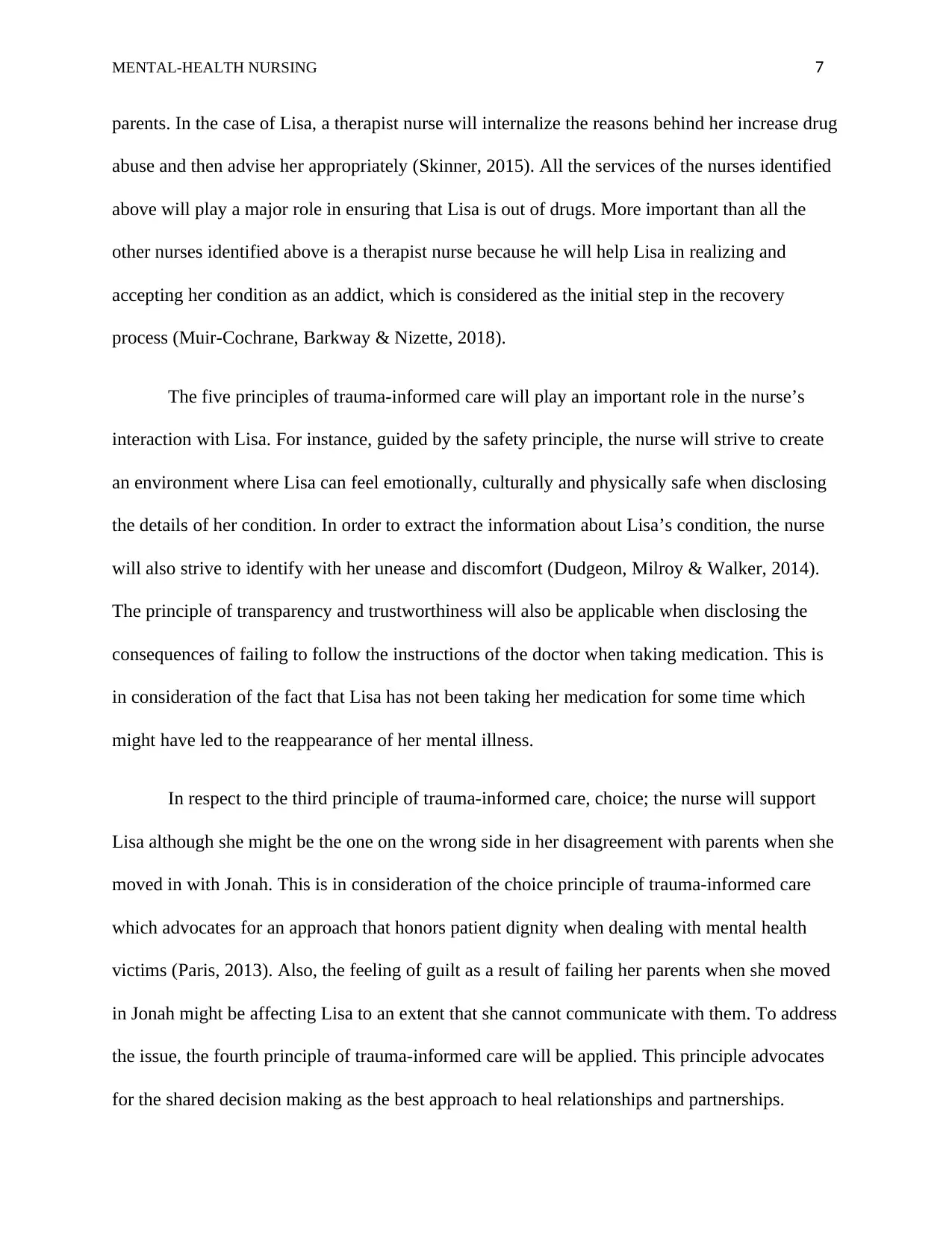
MENTAL-HEALTH NURSING 7
parents. In the case of Lisa, a therapist nurse will internalize the reasons behind her increase drug
abuse and then advise her appropriately (Skinner, 2015). All the services of the nurses identified
above will play a major role in ensuring that Lisa is out of drugs. More important than all the
other nurses identified above is a therapist nurse because he will help Lisa in realizing and
accepting her condition as an addict, which is considered as the initial step in the recovery
process (Muir-Cochrane, Barkway & Nizette, 2018).
The five principles of trauma-informed care will play an important role in the nurse’s
interaction with Lisa. For instance, guided by the safety principle, the nurse will strive to create
an environment where Lisa can feel emotionally, culturally and physically safe when disclosing
the details of her condition. In order to extract the information about Lisa’s condition, the nurse
will also strive to identify with her unease and discomfort (Dudgeon, Milroy & Walker, 2014).
The principle of transparency and trustworthiness will also be applicable when disclosing the
consequences of failing to follow the instructions of the doctor when taking medication. This is
in consideration of the fact that Lisa has not been taking her medication for some time which
might have led to the reappearance of her mental illness.
In respect to the third principle of trauma-informed care, choice; the nurse will support
Lisa although she might be the one on the wrong side in her disagreement with parents when she
moved in with Jonah. This is in consideration of the choice principle of trauma-informed care
which advocates for an approach that honors patient dignity when dealing with mental health
victims (Paris, 2013). Also, the feeling of guilt as a result of failing her parents when she moved
in Jonah might be affecting Lisa to an extent that she cannot communicate with them. To address
the issue, the fourth principle of trauma-informed care will be applied. This principle advocates
for the shared decision making as the best approach to heal relationships and partnerships.
parents. In the case of Lisa, a therapist nurse will internalize the reasons behind her increase drug
abuse and then advise her appropriately (Skinner, 2015). All the services of the nurses identified
above will play a major role in ensuring that Lisa is out of drugs. More important than all the
other nurses identified above is a therapist nurse because he will help Lisa in realizing and
accepting her condition as an addict, which is considered as the initial step in the recovery
process (Muir-Cochrane, Barkway & Nizette, 2018).
The five principles of trauma-informed care will play an important role in the nurse’s
interaction with Lisa. For instance, guided by the safety principle, the nurse will strive to create
an environment where Lisa can feel emotionally, culturally and physically safe when disclosing
the details of her condition. In order to extract the information about Lisa’s condition, the nurse
will also strive to identify with her unease and discomfort (Dudgeon, Milroy & Walker, 2014).
The principle of transparency and trustworthiness will also be applicable when disclosing the
consequences of failing to follow the instructions of the doctor when taking medication. This is
in consideration of the fact that Lisa has not been taking her medication for some time which
might have led to the reappearance of her mental illness.
In respect to the third principle of trauma-informed care, choice; the nurse will support
Lisa although she might be the one on the wrong side in her disagreement with parents when she
moved in with Jonah. This is in consideration of the choice principle of trauma-informed care
which advocates for an approach that honors patient dignity when dealing with mental health
victims (Paris, 2013). Also, the feeling of guilt as a result of failing her parents when she moved
in Jonah might be affecting Lisa to an extent that she cannot communicate with them. To address
the issue, the fourth principle of trauma-informed care will be applied. This principle advocates
for the shared decision making as the best approach to heal relationships and partnerships.
Paraphrase This Document
Need a fresh take? Get an instant paraphrase of this document with our AI Paraphraser
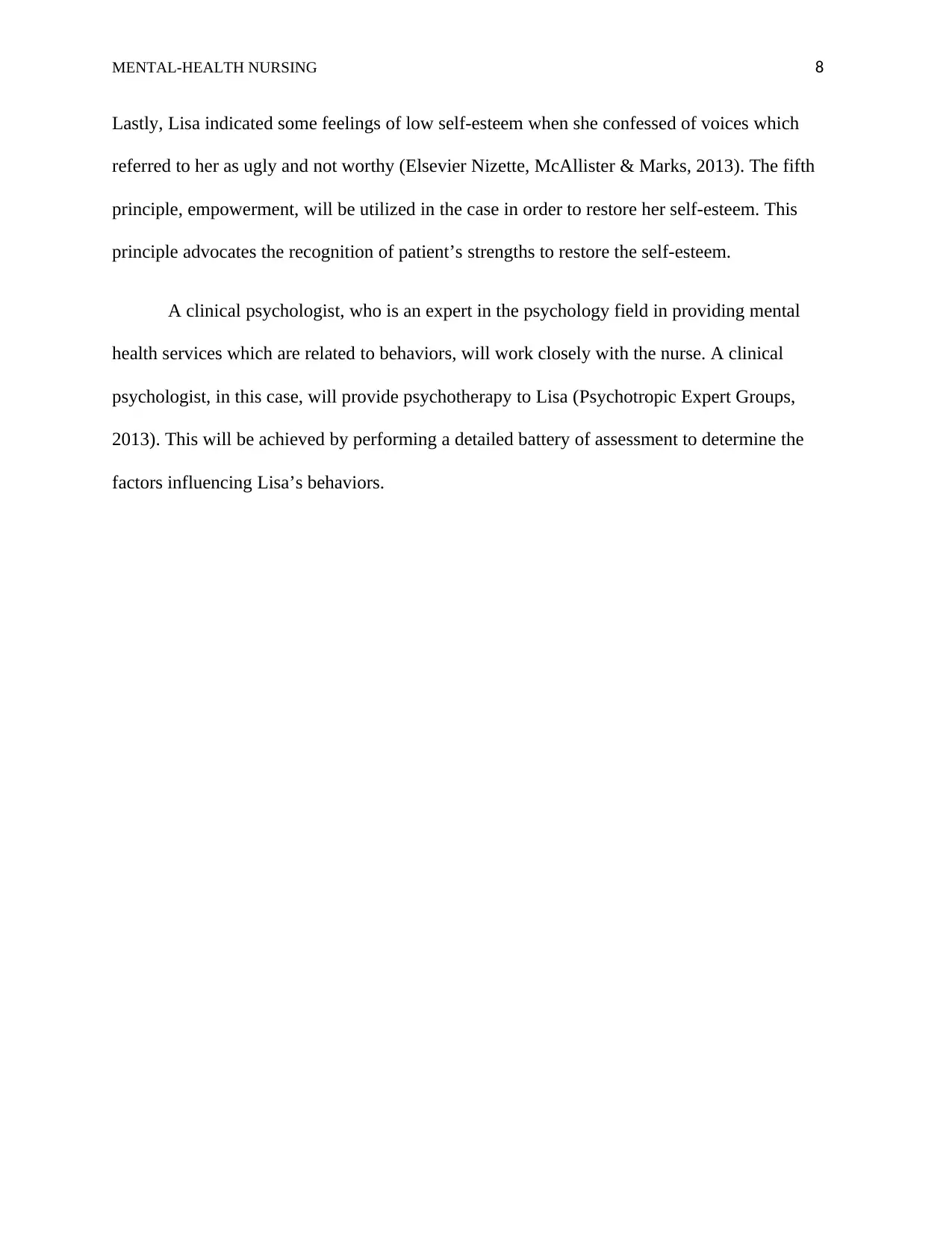
MENTAL-HEALTH NURSING 8
Lastly, Lisa indicated some feelings of low self-esteem when she confessed of voices which
referred to her as ugly and not worthy (Elsevier Nizette, McAllister & Marks, 2013). The fifth
principle, empowerment, will be utilized in the case in order to restore her self-esteem. This
principle advocates the recognition of patient’s strengths to restore the self-esteem.
A clinical psychologist, who is an expert in the psychology field in providing mental
health services which are related to behaviors, will work closely with the nurse. A clinical
psychologist, in this case, will provide psychotherapy to Lisa (Psychotropic Expert Groups,
2013). This will be achieved by performing a detailed battery of assessment to determine the
factors influencing Lisa’s behaviors.
Lastly, Lisa indicated some feelings of low self-esteem when she confessed of voices which
referred to her as ugly and not worthy (Elsevier Nizette, McAllister & Marks, 2013). The fifth
principle, empowerment, will be utilized in the case in order to restore her self-esteem. This
principle advocates the recognition of patient’s strengths to restore the self-esteem.
A clinical psychologist, who is an expert in the psychology field in providing mental
health services which are related to behaviors, will work closely with the nurse. A clinical
psychologist, in this case, will provide psychotherapy to Lisa (Psychotropic Expert Groups,
2013). This will be achieved by performing a detailed battery of assessment to determine the
factors influencing Lisa’s behaviors.
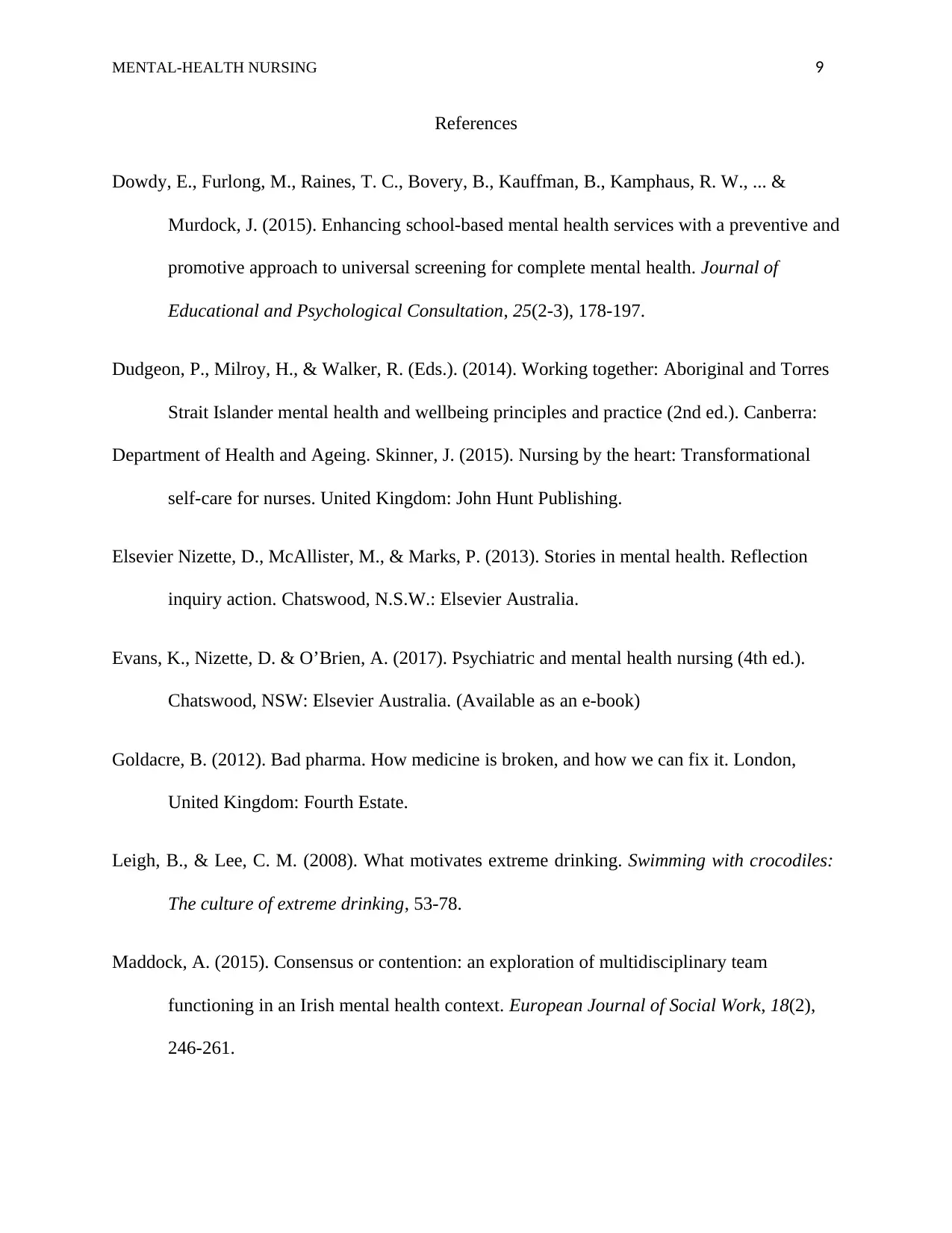
MENTAL-HEALTH NURSING 9
References
Dowdy, E., Furlong, M., Raines, T. C., Bovery, B., Kauffman, B., Kamphaus, R. W., ... &
Murdock, J. (2015). Enhancing school-based mental health services with a preventive and
promotive approach to universal screening for complete mental health. Journal of
Educational and Psychological Consultation, 25(2-3), 178-197.
Dudgeon, P., Milroy, H., & Walker, R. (Eds.). (2014). Working together: Aboriginal and Torres
Strait Islander mental health and wellbeing principles and practice (2nd ed.). Canberra:
Department of Health and Ageing. Skinner, J. (2015). Nursing by the heart: Transformational
self-care for nurses. United Kingdom: John Hunt Publishing.
Elsevier Nizette, D., McAllister, M., & Marks, P. (2013). Stories in mental health. Reflection
inquiry action. Chatswood, N.S.W.: Elsevier Australia.
Evans, K., Nizette, D. & O’Brien, A. (2017). Psychiatric and mental health nursing (4th ed.).
Chatswood, NSW: Elsevier Australia. (Available as an e-book)
Goldacre, B. (2012). Bad pharma. How medicine is broken, and how we can fix it. London,
United Kingdom: Fourth Estate.
Leigh, B., & Lee, C. M. (2008). What motivates extreme drinking. Swimming with crocodiles:
The culture of extreme drinking, 53-78.
Maddock, A. (2015). Consensus or contention: an exploration of multidisciplinary team
functioning in an Irish mental health context. European Journal of Social Work, 18(2),
246-261.
References
Dowdy, E., Furlong, M., Raines, T. C., Bovery, B., Kauffman, B., Kamphaus, R. W., ... &
Murdock, J. (2015). Enhancing school-based mental health services with a preventive and
promotive approach to universal screening for complete mental health. Journal of
Educational and Psychological Consultation, 25(2-3), 178-197.
Dudgeon, P., Milroy, H., & Walker, R. (Eds.). (2014). Working together: Aboriginal and Torres
Strait Islander mental health and wellbeing principles and practice (2nd ed.). Canberra:
Department of Health and Ageing. Skinner, J. (2015). Nursing by the heart: Transformational
self-care for nurses. United Kingdom: John Hunt Publishing.
Elsevier Nizette, D., McAllister, M., & Marks, P. (2013). Stories in mental health. Reflection
inquiry action. Chatswood, N.S.W.: Elsevier Australia.
Evans, K., Nizette, D. & O’Brien, A. (2017). Psychiatric and mental health nursing (4th ed.).
Chatswood, NSW: Elsevier Australia. (Available as an e-book)
Goldacre, B. (2012). Bad pharma. How medicine is broken, and how we can fix it. London,
United Kingdom: Fourth Estate.
Leigh, B., & Lee, C. M. (2008). What motivates extreme drinking. Swimming with crocodiles:
The culture of extreme drinking, 53-78.
Maddock, A. (2015). Consensus or contention: an exploration of multidisciplinary team
functioning in an Irish mental health context. European Journal of Social Work, 18(2),
246-261.
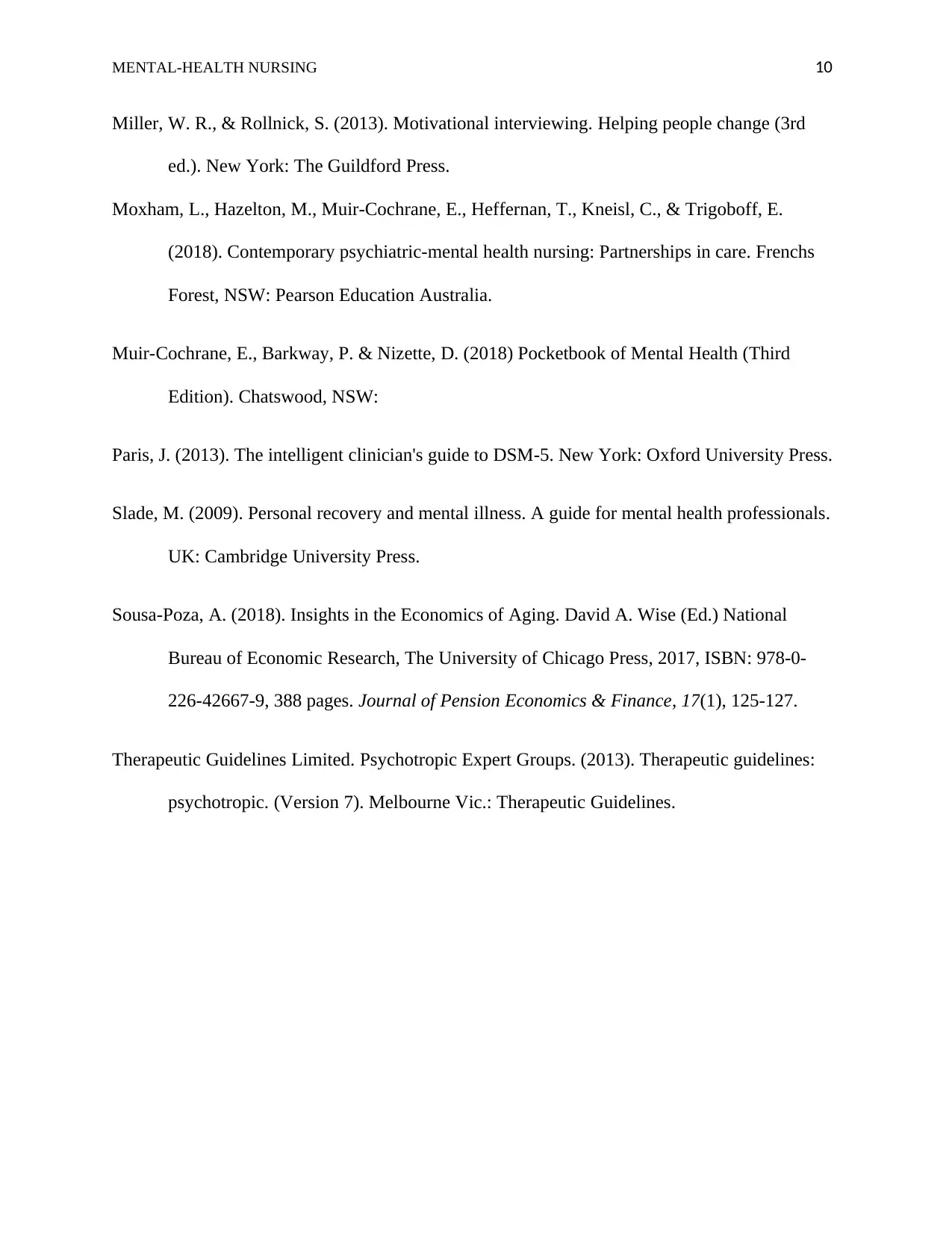
MENTAL-HEALTH NURSING 10
Miller, W. R., & Rollnick, S. (2013). Motivational interviewing. Helping people change (3rd
ed.). New York: The Guildford Press.
Moxham, L., Hazelton, M., Muir-Cochrane, E., Heffernan, T., Kneisl, C., & Trigoboff, E.
(2018). Contemporary psychiatric-mental health nursing: Partnerships in care. Frenchs
Forest, NSW: Pearson Education Australia.
Muir-Cochrane, E., Barkway, P. & Nizette, D. (2018) Pocketbook of Mental Health (Third
Edition). Chatswood, NSW:
Paris, J. (2013). The intelligent clinician's guide to DSM-5. New York: Oxford University Press.
Slade, M. (2009). Personal recovery and mental illness. A guide for mental health professionals.
UK: Cambridge University Press.
Sousa-Poza, A. (2018). Insights in the Economics of Aging. David A. Wise (Ed.) National
Bureau of Economic Research, The University of Chicago Press, 2017, ISBN: 978-0-
226-42667-9, 388 pages. Journal of Pension Economics & Finance, 17(1), 125-127.
Therapeutic Guidelines Limited. Psychotropic Expert Groups. (2013). Therapeutic guidelines:
psychotropic. (Version 7). Melbourne Vic.: Therapeutic Guidelines.
Miller, W. R., & Rollnick, S. (2013). Motivational interviewing. Helping people change (3rd
ed.). New York: The Guildford Press.
Moxham, L., Hazelton, M., Muir-Cochrane, E., Heffernan, T., Kneisl, C., & Trigoboff, E.
(2018). Contemporary psychiatric-mental health nursing: Partnerships in care. Frenchs
Forest, NSW: Pearson Education Australia.
Muir-Cochrane, E., Barkway, P. & Nizette, D. (2018) Pocketbook of Mental Health (Third
Edition). Chatswood, NSW:
Paris, J. (2013). The intelligent clinician's guide to DSM-5. New York: Oxford University Press.
Slade, M. (2009). Personal recovery and mental illness. A guide for mental health professionals.
UK: Cambridge University Press.
Sousa-Poza, A. (2018). Insights in the Economics of Aging. David A. Wise (Ed.) National
Bureau of Economic Research, The University of Chicago Press, 2017, ISBN: 978-0-
226-42667-9, 388 pages. Journal of Pension Economics & Finance, 17(1), 125-127.
Therapeutic Guidelines Limited. Psychotropic Expert Groups. (2013). Therapeutic guidelines:
psychotropic. (Version 7). Melbourne Vic.: Therapeutic Guidelines.
1 out of 10
Related Documents
Your All-in-One AI-Powered Toolkit for Academic Success.
+13062052269
info@desklib.com
Available 24*7 on WhatsApp / Email
![[object Object]](/_next/static/media/star-bottom.7253800d.svg)
Unlock your academic potential
© 2024 | Zucol Services PVT LTD | All rights reserved.





